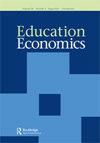越南上10年级:就业热潮会阻碍上学吗?
IF 0.9
Q3 Social Sciences
引用次数: 2
摘要
蓝领就业的增长通过提高收入增加了受教育的机会,但也减少了一些学生超越义务教育的动力。这些相互矛盾的影响可能有助于解释越南高中教育进展相对缓慢和不平衡的增长,越南经历了主要是低技能制造业的外国投资热潮。我们使用高中入学考试参与率和分数的数据来分析由于需求侧和供给侧因素造成的变化。这些数据来自不太发达的省份,因此说明了在广泛的边缘地区,特别是少数民族地区,深化教育发展所面临的挑战。本文章由计算机程序翻译,如有差异,请以英文原文为准。
Getting to Grade 10 in Vietnam: does an employment boom discourage schooling?
ABSTRACT Blue-collar employment growth increases schooling opportunities by raising incomes, but also reduces incentives for some students to advance beyond compulsory education. These contradictory influences may help to explain relatively slow and uneven growth of progression to upper-secondary schooling in Vietnam, which has experienced a foreign investment boom in mainly low-skill manufacturing industries. We use data on participation rates and scores in an upper-secondary school entrance exam to analyze variation due to demand-side and supply-side factors. The data come from less advanced provinces and so illuminate the challenges of deepening educational development at the extensive margin, especially among ethnic minority populations.
求助全文
通过发布文献求助,成功后即可免费获取论文全文。
去求助
来源期刊

Education Economics
EDUCATION & EDUCATIONAL RESEARCH-
CiteScore
2.00
自引率
8.30%
发文量
38
期刊介绍:
Education Economics is a peer-reviewed journal serving as a forum for debate in all areas of the economics and management of education. Particular emphasis is given to the "quantitative" aspects of educational management which involve numerate disciplines such as economics and operational research. The content is of international appeal and is not limited to material of a technical nature. Applied work with clear policy implications is especially encouraged. Readership of the journal includes academics in the field of education, economics and management; civil servants and local government officials responsible for education and manpower planning; educational managers at the level of the individual school or college.
 求助内容:
求助内容: 应助结果提醒方式:
应助结果提醒方式:


